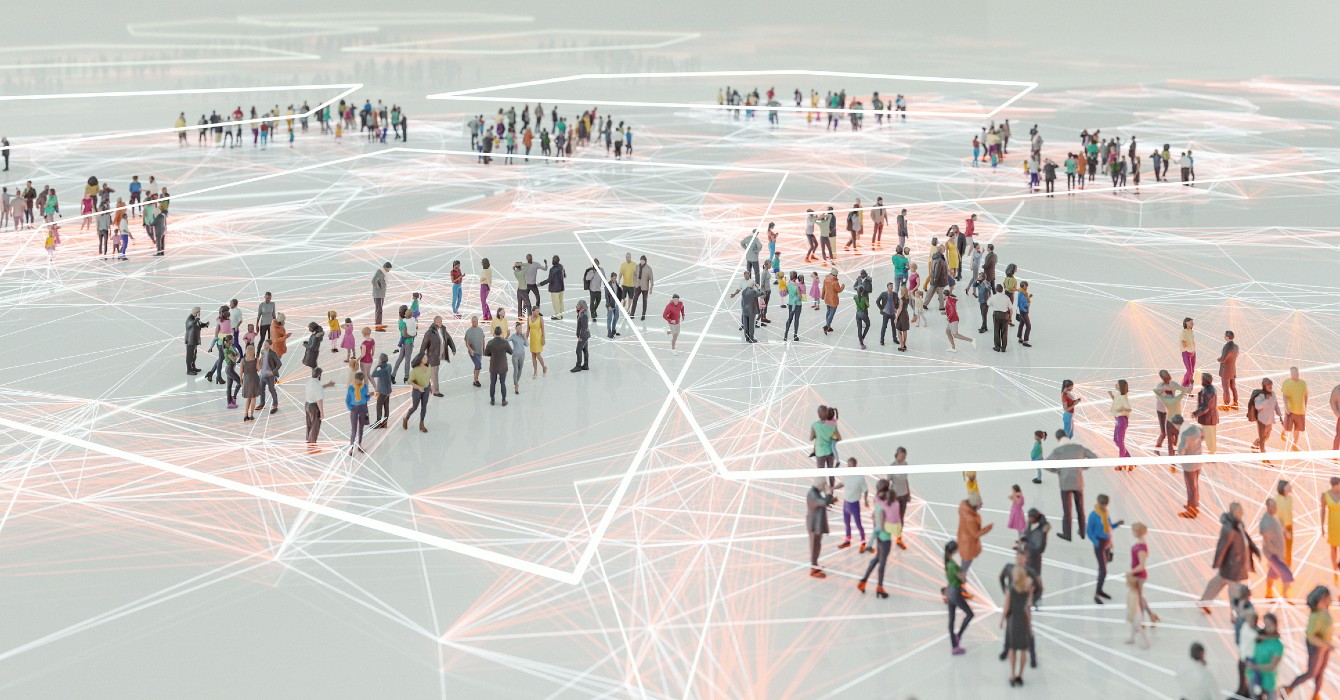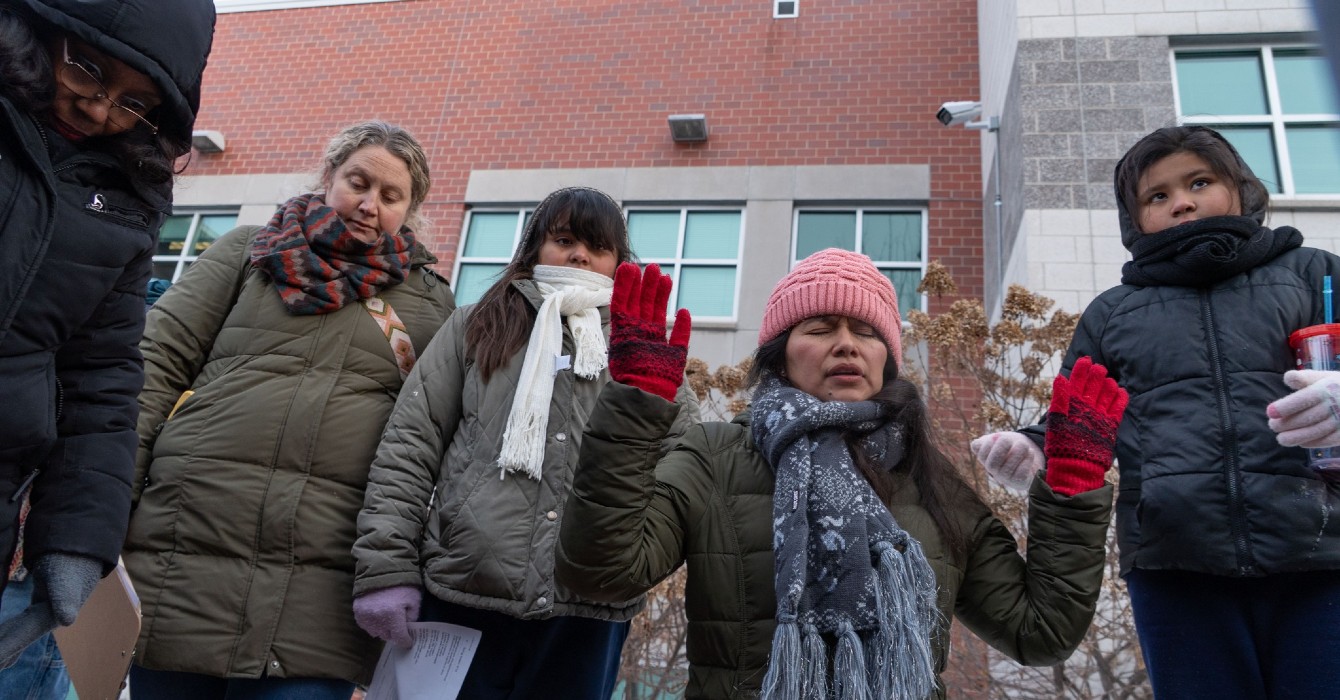Rick Love is on his fourth career: he has been a pastor, a missionary, a missionary director and, for the past eight years, a peacemaker.
“God has called me to peacemaking,” said Love, who is the president and co-founder of Peace Catalyst International, an organization that focuses on reconciliation between Christians and Muslims.
He does what he calls “social peacemaking,” which breaks down barriers of prejudice, stereotypes and fears, primarily by building relationships between Christians and Muslims.
One important aspect of his approach is getting people to sit down together for a conversation or a meal.
“I tell people the key to peacemaking is drinking lots of coffee and tea,” he said.
 Love has a Th.M. in New Testament and a D.Min. in urban studies from Westminster Theological Seminary, as well as an M.A. in theology and a Ph.D. in intercultural studies from Fuller Theological Seminary. He conducted postdoctoral research in peacemaking at the Yale University Center for Faith and Culture. Love convened the 2012 summit Evangelicals for Peace: A Summit on Christian Moral Responsibility in the 21st Century at Georgetown University.
Love has a Th.M. in New Testament and a D.Min. in urban studies from Westminster Theological Seminary, as well as an M.A. in theology and a Ph.D. in intercultural studies from Fuller Theological Seminary. He conducted postdoctoral research in peacemaking at the Yale University Center for Faith and Culture. Love convened the 2012 summit Evangelicals for Peace: A Summit on Christian Moral Responsibility in the 21st Century at Georgetown University.
He spoke to Faith & Leadership while at Duke Divinity School as a faculty member for the Center for Reconciliation’s Summer Institute. The following is an edited transcript.
Q: What’s your approach to peacemaking?
I see myself as pioneering in two areas: evangelical peacemaking and, specifically, Christian-Muslim relations. Christians and Muslims make up over half the world’s population, so if there’s not peace at some level between these two groups, it’s going to be hard to have peace in the world.
I’m just trying to be faithful to Jesus. My philosophy -- I think it’s summarized well in Romans 12:18: “If possible, so far as it depends on you, live at peace with everyone.” I call this “peacemaking for dummies.”
It’s not a suggestion; it is a command. In light of that, I feel that as followers of Jesus, we should be proactive in reaching out to Muslims and doing everything we can to break down barriers between Christians and Muslims.
In my studies, I’ve come up with six spheres of peace or peacemaking. There’s personal peace, interpersonal peace, social peace, and then urban, national and international. I see Christian-Muslim as predominantly social peace.
What’s unique about social peacemaking is that it deals with prejudices, fears, all those kinds of factors. So one of the ways that we at Peace Catalyst have lived this out and tried to be proactive is we get Christians and Muslims together to break down barriers, build bridges of love, and we do that usually over meals.
We have lots of different programs. We help people that have never met a Muslim and are scared to death; we have programs we call Peace Feasts, where we go into a Middle Eastern restaurant.
I tell people the key to peacemaking is drinking lots of coffee and tea. I sit down with imams; I sit down with leaders in the mosque and try to build relationships and see if we can get people together.
In social peacemaking, we start with the prejudices. With all the media and all the hype about terrorism and misunderstandings about Islam, it’s rampant.
Q: Tell me, what do you do? You mentioned meals. You mentioned having coffee, conversations.
Well, [we start with] drinking tea, building relationship, and then we set up some kind of a meeting -- a gathering, a peace event. Sometimes, our peace events can be five people around a table. Or it could be 150.
Q: Are you usually invited, or are these things that you initiate?
I usually initiate them. We start with relationship, and we try to set up a program so there’s a safe space. We do the best we can to make people feel at home.
I initiated a Love Your Neighbor dinner in Arizona. We talked about meeting twice, and so they wanted to first have us at the mosque. So even though it was a Peace Catalyst initiative, we first met at the mosque and then at our church.
When we had people from the mosque come to visit us, we had a Texas pastor. We were in Arizona, but he was from Texas, so he was really into barbecue. Well, he bought a half-side of halal beef and he barbecued it eight hours. And when we put out the food, we had Middle Eastern food, and then we had that.
I was laughing and saying, “They’re not going to eat this.” But they went back for seconds! They loved the barbecue, and the fact that this was halal and he went to that effort won them over. If you get the leaders and they feel safe, people will watch the leaders.
[In another place], we did what we call a Quick to Listen dinner. The Scripture says, “Be quick to listen, slow to speak, slow to anger.” In an age of sound-bite theology and all the media about Muslims, we [Christians] need to be quick to listen. And we also want them to be quick to listen, because they have stereotypes about Christians.
We had formal invitations and gave some Scripture from both the Quran and the New Testament about what we were going to be doing.
We tried as much as possible to get women with women, men with men. It’s not so much to follow [the Muslim] approach to how the sexes should relate, but for long-term friendships, that’s really the best way to go.
Then we had our meal. We grabbed the food, and then we began asking questions. We had a sheet of paper at each table with questions: “What is your favorite verse in the Bible or the Quran?” “What is your favorite religious holiday?” “Tell us something about your family.”
There was a spectrum from more complex to simple. Then people could do what they wanted.
Q: What you describe is people within one community coming together, and you have hopes of building relationships that continue.
Right. We work locally.
Q: How do you measure peacemaking? What are your markers of success?
I’ll tell you what we do now. We want to get better at measuring success.
One thing is to count training events. Anytime we’re speaking to Christians, we challenge them to love and reach out and do peacemaking. That’s an activity. We don’t know all the fruit, but we do measure [the activity].
We just celebrated five years, and as I read all the documents and did the history of our staff, I realized that Peace Catalyst has put on at least one peacemaking event a week over five years.
As for breaking down barriers, building bridges of love, dealing with prejudices -- in terms of success, I’d say a couple of things.
Remember earlier I said we had the mosque over and shared halal barbecue? I had a good relationship with the president of the mosque and the imam there, and just recently, a former Marine and a bunch of bikers came to the mosque to intimidate. They wore graphic, gross shirts, and they brought firearms. This was high-powered.
Well, a Peace Catalyst co-founder Jim Mullins along with Adam Estle and Usama Shami had only one day’s notice [of the protest event], but they got about 150 Christians to the mosque prior to the coming of the bikers. Their goal was just to build a wall of prayer and peace so there would be no violence. It was an amazing story.
That’s an example of something that could have been violent.
Q: But the groundwork paid off.
Because of all the relationships and all the people working together, it was peaceful. In fact, there were a number of the bikers that took their shirts off and turned them inside out, because they were embarrassed once they met Muslims that were reaching out very warmly.
How do you measure something like that? What’s the impact? I think it’s going to be long-term. We’re still learning. We’ve got a ways to go in terms of how to measure peacemaking. But certainly, the seeds were planted.
Q: Is there a tension between your evangelicalism and your peacemaking, either for you or for the Muslims you work with?
When Peace Catalyst started, I was trying to raise money and we were sharing with a number of people, and one woman said, “But if people don’t come to Christ, everything is worthless.” I think that summarizes how some evangelicals feel.
I would say no, peacemaking is one of those good deeds that glorifies God. That’s the way we let our light shine in the world. And that’s not worthless.
If you see peacemaking as a strategy to evangelize, then you probably should go find a mission, and not Peace Catalyst, because we’re serious about our peacemaking.
Now, having said that, I am an evangelical. I believe. I’m fully committed to Jesus and want to share good news about him. The fact is, many of the imams I work with would love me to embrace Islam. They know I would love them to embrace Jesus. And we just kind of deal with it and get over it.
Q: You agree to disagree?
Well, I think it’s like this. If that imam really loves me, he would want me to embrace Islam. If I really love him, I want him to embrace the gospel. I was just with a good friend, an imam, and we had just had our meal and were about to go our separate ways.
He says, “You know, Rick, I have a dream. I can dream -- right, Rick?” I say, “Yeah. What’s your dream?” “I dream of you becoming an imam and working with me here.”
I appreciate that.
I think we live with tension in many facets of our Christian life. Jesus was full of grace and truth. Jesus was fully God and man. So much of Scripture is both-and rather than either-or.
As I’ve wrestled more deeply with peacemaking, as I’ve grown and pored over the gospels and looked at how Jesus relates to people, I realize that Jesus not only taught and modeled exclusive truth claims, but he taught and modeled “inclusive love aims,” and he was always working with the marginalized.
He challenges the most liberal with his truth claims. He challenges the conservative with his love aims. I’m just enthralled with Jesus, challenged by Jesus, and I think if the church really sees these exclusive truth claims and inclusive love aims and we live with that tension, I think there’ll be some amazing breakthroughs in peacemaking and reconciliation.
Q: What advice would you give Christian leaders who are interested in peacemaking?
The first step is the hard step for a leader -- just to go to the mosque to visit, to talk, to say, “Can we go out for a meal?” As I said, I see peacemaking as being proactive.
It’s out of your comfort zone. It doesn’t necessarily feel good to be proactive.
Q: Is it particularly important for Christians to engage with Muslims, versus Jews or black-and-white reconciliation or all the different ways that one could pursue peacemaking?
Well, certainly everything you mentioned is, I think, dear to the heart of Jesus. There are different callings.
As I mentioned earlier, I think it is significant that Christians and Muslims make up over half the world’s population. Two, people are very fearful of terrorism. I believe one of the keys to addressing radicalism is partnering with mainstream Muslims -- the vast majority -- and working against radicalism.
In different areas, there will be larger pockets of Muslims, and so the very nature of demographics should move some to say, “We should do something.”






